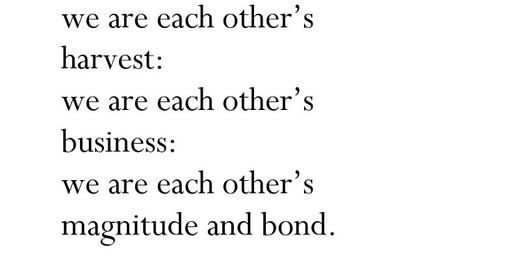Kwanzaa Day 3: Ujima
Today we open with an offering from Gwendolyn Brooks, a black woman and poet whose memorable lyrics remain instruction and inspiration, especially in light of today’s principle of Ujima.
Brooks’ posits the following:
Ujima, the third principle of the Nguzo Saba, is conventionally rendered as collective work and responsibility. That definition isn’t exhaustive but works well enough. It reminds of things like the National Political Convention in Gary, Indiana in 1972, surely a collective work and responsibility moment. It also reminds me the movement for black lives, contemporary pushes for abolition and the like, stemming from 2012 or so, depending on how one marks the beginning. Collective responsibility in terms of moral grammar, is about the difficult widening of ethical responsibility form a first person me, to a second person we, my to our, “this is how I see it” to “how might we envision our freedom and well-being”.
Work and responsibility, in public, diasporic terms is practical talk. Plain, concrete, pragamatic, actionable, doable moral language.
I like it. We need it these days, and always.
Ujima is necessary prose in the Nguzo Saba, juxtaposed against the rhapsody of faith, purpose, creativity, unity, cooperate economics, self-determination.
All of these six Nguzo Saba principles are worthy ideals. But none of them — not a single one — is realizable in practice without consistent application of collective work and collective responsibility.
Without delegation, clear timelines, mutually shared expectation, meeting agendas, next steps, flip charts, divisions of labor understood by all, the very quotidian matters of management, administration, the like.
Without these, liberation talk of any sort is a hoax, a hustle, a hortatory exercise towards a promised land with zero apparatus for getting people to work together, in coordinated fashion to get there.
Ujima is Ella Josephine Baker organizer.
Ujima is Nat Turner organizing slave revolt.
Ujima is Wangari Mattai’s Greenbelt movement.
Ujima is top of the year vision board to coalesce our desire into discrete objects of aspiration, thereby making execution possible.
Ujima is the means, the method, the work breakdown structures in the key of equity and effectiveness that convert ideals into all the stuff we want.
In honor of this principle, I’ve composed an ode to Ujima, below:
Are we, in deed, responsible?
If you live beneath your potential,
If you suffer a thousand cuts of injustice,
We, who are not your family, owe you.
black colleges have a duty.
black churches, too.
Black scholars, salons, civil rights groups.
They all owe you.
The debt? A place named imagination where dreaming and doing are possible.



